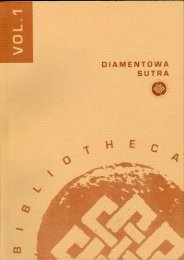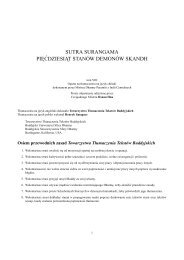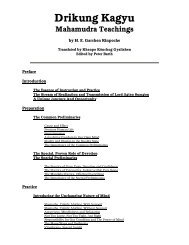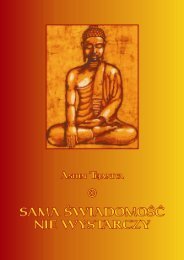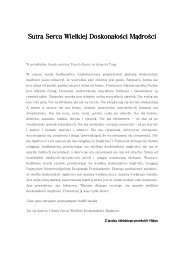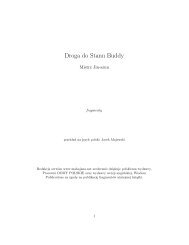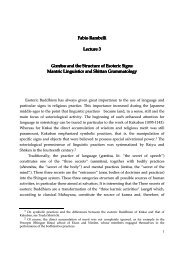My Zazen Sankyu (san = to participate humbly; kyu ... - Valley Zendo
My Zazen Sankyu (san = to participate humbly; kyu ... - Valley Zendo
My Zazen Sankyu (san = to participate humbly; kyu ... - Valley Zendo
You also want an ePaper? Increase the reach of your titles
YUMPU automatically turns print PDFs into web optimized ePapers that Google loves.
tend <strong>to</strong> think that we are sitting zazen. This is not the case. The entire universe is sitting<br />
zazen.”<br />
Yokoyama Roshi is saying that in zazen we can rely upon sitting posture alone. He is<br />
saying that Buddhism as the source of wisdom is not essential. When there is nothing but<br />
zazen posture, a phea<strong>san</strong>t will s<strong>to</strong>p and stare at zazen. <strong>Zazen</strong> is just <strong>to</strong> sit. If we sit, that<br />
is all there is. Thus, zazen is available <strong>to</strong> everyone. Simply instructing people on the<br />
elements of the proper posture of zazen - fold your legs like this, hold your hands like<br />
this, stretch your back, pull in your chin - is enough. Yokoyama Roshi was quoting the<br />
Bible (Matthew 5-37) when he said: “Say yes when you mean yes, and no when you<br />
mean no. Anything beyond this comes from the evil one.”<br />
In the Annual Collected Essays, published by Antaiji in 1976, Yokoyama Roshi wrote:<br />
“Let me restate zaso korin in slightly different words: A flower blooming or a human<br />
being thinking are events which occur on a cosmic scale. If we look at human beings<br />
from the point of view of the stars, we can see that human beings are just part of the<br />
universe. Trees, flowers, human beings and human action all are connected <strong>to</strong> the whole<br />
universe.” He is telling us that in zazen we adopt a posture in which we accept the fact<br />
that we are seamlessly connected with the whole universe; we immediately and naturally<br />
conform <strong>to</strong> it with our own body-mind.<br />
He is also saying that a person sitting and breathing in full lotus posture is the grass, a<br />
tree, a bird, a life - the person is the world, the person is “keisei <strong>san</strong>shiki” the voice of<br />
valleys, the form of the mountains. The universe itself.<br />
This may just sound grandiose, like a fantasy far removed from the reality of daily life.<br />
However, it will be helpful <strong>to</strong> recall that Shigeo Miki (cf. Notebook 4) asserted<br />
essentially the same idea, drawing on evidence from a field of exploration very different<br />
from Buddhism. I personally feel a very strong need <strong>to</strong> reconsider Buddhism along the<br />
lines indicated by Yokoyama Roshi and Shigeo Miki.<br />
<strong>Zazen</strong> as zaso korin can be practiced by anyone in the world. Anyone who actually<br />
practices zaso korin can immediately experience and understand it. The rest of one's life,<br />
Yokoyama Roshi said, can be lived in a way that is harmonious with the traditions and<br />
character of one's country.<br />
The great challenge is <strong>to</strong> get practitioners <strong>to</strong> understand and accept that it is zazen posture<br />
that is precious. It is not your own brain or personality that are most valuable. For<br />
someone like me, who's life is centered on zazen, the last 22 years of Yokoyama Roshi's<br />
life spent at the Ruins of Komoro Castle Memorial Park - he called the place the Blue<br />
Sky Temple on Sunshine Mountain - is a beacon lighting my way. I am deeply grateful<br />
for the karmic connections that allowed me <strong>to</strong> see Yokoyama Roshi, even though it was<br />
only for five minutes or so, before I became a monk at Antaiji, the temple with which he<br />
was so closely connected.



![Shushogi, Dogen Zenji [PDF] - Mahajana.net](https://img.yumpu.com/50921105/1/190x219/shushogi-dogen-zenji-pdf-mahajananet.jpg?quality=85)

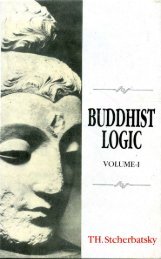
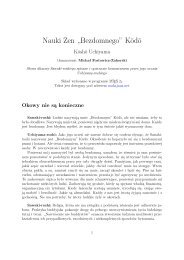
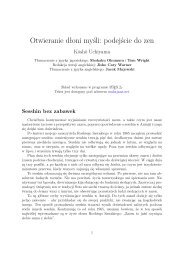
![wywiadu z Murakami Kosho Roshim [PDF] - Buddyzm w Polsce i na ...](https://img.yumpu.com/45809746/1/184x260/wywiadu-z-murakami-kosho-roshim-pdf-buddyzm-w-polsce-i-na-.jpg?quality=85)
